-
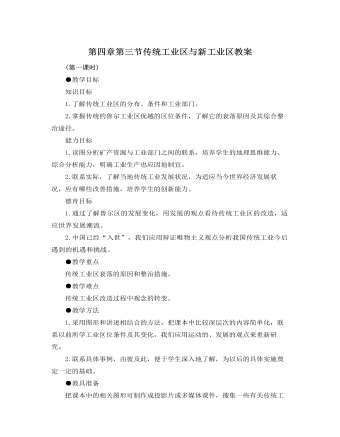
人教版新课标高中地理必修2第四章第三节传统工业区与新工业区教案
知识目标1.了解传统工业区的分布、条件和工业部门。2.掌握传统的鲁尔工业区优越的区位条件,了解它的衰落原因及其综合整治途径。能力目标1.读图分析矿产资源与工业部门之间的联系,培养学生的地理思维能力、综合分析能力,明确工业生产也应因地制宜。2.联系实际,了解当地传统工业发展状况,为适应当今世界经济发展状况,应有哪些改善措施,培养学生的创新能力。德育目标1.通过了解鲁尔区的发展变化,用发展的观点看待传统工业区的改造,适应世界发展潮流。2.中国已经“入世”,我们应用辩证唯物主义观点分析我国传统工业今后遇到的机遇和挑战。

人教版新课标高中物理必修1用牛顿运动定律解决问题(二)教案2篇
观察实验视频实验验证师:其实大家完全可以利用身边的器材来验证。实验1、用弹簧秤挂上钩码,然后迅速上提和迅速下放。现象:在钩码被迅速上提的一瞬间,弹簧秤读数突然变大;在钩码被迅速下放的一瞬间,弹簧秤读数突然变小。师:迅速上提时弹簧秤示数变大是超重还是失重?迅速下放时弹簧秤示数变小是超重还是失重?生:迅速上提超重,迅速下放失重。体会为何用弹簧秤测物体重力时要保证在竖直方向且保持静止或匀速实验2、学生站在医用体重计上,观察下蹲和站起时秤的示数如何变化?在实验前先让同学们理论思考示数会如何变化再去验证,最后再思考。(1)在上升过程中可分为两个阶段:加速上升、减速上升;下蹲过程中也可分为两个阶段:加速下降、减速下降。(2)当学生加速上升和减速下降时会出现超重现象;当学生加速下降和减速上升时会出现失重现象;(3)出现超重现象时加速度方向向上,出现失重现象时加速度方向向下。完全失重
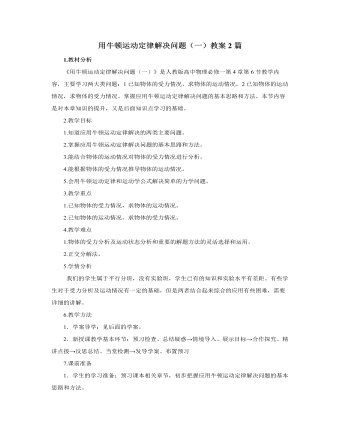
人教版新课标高中物理必修1用牛顿运动定律解决问题(一)教案2篇
(四)实例探究☆力和运动的关系1、一个物体放在光滑水平面上,初速为零,先对物体施加一向东的恒力F,历时1秒,随即把此力改变为向西,大小不变,历时1秒钟,接着又把此力改为向东,大小不变,历时1秒钟,如此反复只改变力的方向,共历时1分钟,在此1分钟内A.物体时而向东运动,时而向西运动,在1分钟末静止于初始位置之东B.物体时而向东运动,时而向西运动,在1分钟末静止于初始位置C.物体时而向东运动,时而向西运动,在1分钟末继续向东运动D.物体一直向东运动,从不向西运动,在1分钟末静止于初始位置之东☆牛顿运动定律的应用2、用30N的水平外力F,拉一静止放在光滑的水平面上质量为20kg的物体,力F作用3秒后消失,则第5秒末物体的速度和加速度分别是A.v=7.5m/s,a=l.5m/s2B.v=4.5m/s,a=l.5m/s2C.v=4.5m/s,a=0D.v=7.5m/s,a=0
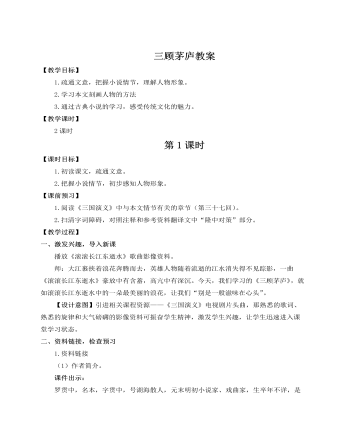
人教部编版语文九年级上册三顾茅庐教案
1.发散思维诸葛亮出山后为刘备鞠躬尽瘁,死而后已,勤勉一生,做了许多大事。关于诸葛亮的故事,你还知道多少呢?请列举出来。预设:火烧博望坡、火烧新野、舌战群儒、智激周瑜、七星坛借东风、巧布八阵图、空城计、挥泪斩马谡、七擒孟获、六出祁山、星落五丈原……2.拓展阅读布置学生课后阅读《三国演义》中相关回目(第四十、四十三、四十四、四十九、八十四、九十、九十六、一百零三回等)。【设计意图】《三国演义》中关于诸葛亮的章节很多,这样拓展,一是让已经读完《三国演义》的学生积极展示他的所读所知,二是有效激发还未读完《三国演义》这部书的同学的阅读兴趣。结束语:虽然“古今多少事,都付笑谈中”,但请同学们记住刘备对人才的尊重。尤其在日新月异的当下,创新和发展,都离不开人才,可以毫不夸张地说,得人才者得制高点,得人才者得持续发展,得人才者得最终胜利!
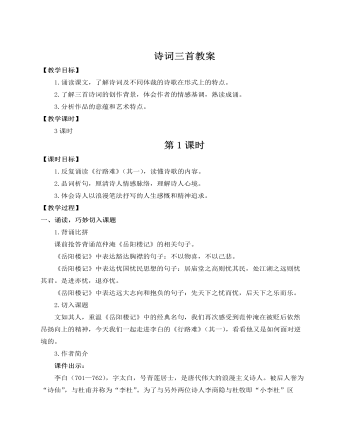
人教部编版语文九年级上册诗词三首教案
预设:在月色和清风中,我的影子开始起舞,恍惚中似乎天堂就在我的眼前。影子随着月光转过那雕梁画栋,穿过阁楼的阻拦。何人在此处失眠?何人在此处低吟?或许我不该怨恨这让我想起离愁的月色。月色有什么错?错的只是我。世上不会有永远,有团聚就有分离。人的悲喜离别就是一场自古以来的痛苦,就像月也有圆缺的苦恼。完美从来都不属于人间。远方的人啊,希望你的生活永远美好,大家虽远隔千里,也能共享这美好皎洁的月光。【设计意图】仅仅停留在理解、体悟上,学生难以感同身受。若动动笔头,用自己的话来表述,学生会更懂词意更解词心,可能会有更多感悟。五、唱月留香课外学唱《但愿人长久》、《思乡曲》(霍勇)等歌曲,积累名家咏月的名句,拓宽视野,加深体验。【设计意图】在比较中学诗词,在歌唱中学诗词,唇齿留香。余音绕梁,三日不绝。结束语:“天若有情天亦老,月如无恨月长圆。”我们在生活中也会有各种各样的遗憾。面对生活中的风雨坎坷,请读一读苏轼的词吧,愿我们的心灵永远澄澈明净,愿我们的人生更加豁达从容!
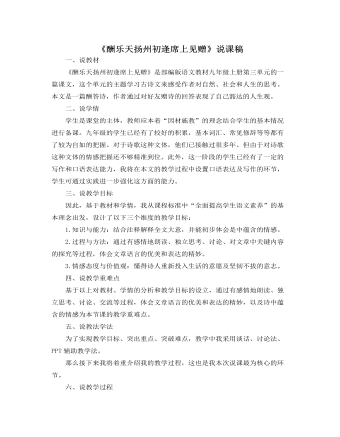
部编版语文九年级上册《酬乐天扬州初逢席上见赠》说课稿
二、说学情学生是课堂的主体,教师应本着“因材施教”的理念结合学生的基本情况进行备课。九年级的学生已经有了较好的积累,基本词汇、常见修辞等等都有了较为自如的把握。对于诗歌这种文体,他们已接触过很多年。但由于对诗歌这种文体的情感把握还不够精准到位。此外,这一阶段的学生已经有了一定的写作和口语表达能力,我将在本文的教学过程中设置口语表达及写作的环节,学生可通过实践进一步强化这方面的能力。三、说教学目标因此,基于教材和学情,我从课程标准中“全面提高学生语文素养”的基本理念出发,设计了以下三个维度的教学目标:1.知识与能力:结合注释解释全文大意,并能初步体会是中蕴含的情感。2.过程与方法:通过有感情地朗读、独立思考、讨论、对文章中关键内容的探究等过程,体会文章语言的优美和表达的精妙。3.情感态度与价值观:懂得诗人重新投入生活的意愿及坚韧不拔的意志。
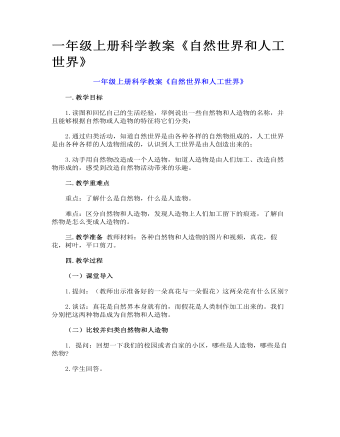
一年级上册科学教案《自然世界和人工世界》
把自然物改造成人造物 1.提问:请小组展示作品,并请别的同学推想这件作品是怎样被改造出来的?我们改造后的树叶是什么样子的?而改造前的树叶又是什么样子的?(教师引导学生思考并说出自然物变成人造物的过程,采用倒推的方式,结合现实中的人造物,去推想制成它的原材料,以及这些原材料在自然界中本来的样子。) 2.提问:生活中还有哪些物品,由自然物被制造成了人造物。(如:演示经过加工变成了石碑或石雕;木头经过加工变成了木槌;兽皮经过加工变成了皮衣等等)
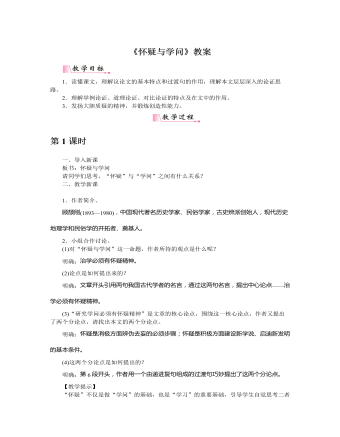
部编版语文九年级上册《怀疑与学问》教案
一、复习回顾、引入新课上节课,我们学习了《怀疑与学问》的内容,也学习了议论文结构的基本特征以及常用的论证方法,这节课我们重点学习议论文在论证论点过程中说理的层次,还要进一步理解议论文分析事理透辟,语言严密的特点。二、教学新课目标导学一:探究说理的层次,明确各段之间的关系请同学们细读课文,边读边思考句与句之间的关系,分组完成以下问题。1.本文论点是“治学必须有怀疑精神”,作者是如何阐述怀疑精神的?明确:对怀疑精神作者阐述得明确而透彻:所谓疑就是决不轻信,经过思考,分清是非,再决定信与不信;进而把怀疑科学地分为“怀疑”“思索”“辨别”三步。2.结合课文思考:作者是如何阐述“从怀疑到创新”这一治学过程的?明确:作者在进一步论证“怀疑是建设新学说、启迪新发明的基本条件”时,又把怀疑到创新的治学过程分析为“怀疑、辩论、评判、修正、创新”。作者通过举例、正反说理,使内容阐述得鞭辟入里,无懈可击。

人音版小学音乐一年级下放牛歌教案
你能不能用你的本领把这山村美景表达出来呢? 老师请画画的小朋友在这花丛里,写诗的在小山坡上……….. 四、完美结课: 小朋友玩的高兴吗?好我们一起回家啦!(播放《郊游》)。 教学反思: 启发学生“你都想到了什么?”从而让学生展开丰富的想象,经过教师的简单小结使学生了解了牧童的生活和放牧时的心情,为学唱歌曲《放牛歌》做情感铺垫。 接下来的“体验理解”环节还是以激发学生兴趣为主,从猜小牧童的“宝贝”(笛子)模仿小牧童吹笛子的动作,到学吹笛子的有节奏的嘀嘀声XXXXXX,到有节奏的模仿小黄牛的叫声X-,我都是在让学生从间奏入手的,目的:一是引导学生会听音乐,能听出哪是间奏;二是让学生充分感受歌曲的旋律,熟悉歌曲;三是培养学生[此文转于斐斐课件园 FFKJ.Net]节奏感,知道笛声和小黄牛的叫声表示的节奏是什么,对两个声部的节奏训练进行一次渗透和尝试。

小学表彰大会学生发言讲话稿五篇
比如这个学期我要取得什么样的成绩,要完成哪些事情,这就是一个长期的目标,而这周乃至今天我该完成什么,这就是一个小目标。我们只有实现了一个个小目标后,才能实现大目标。很多同学有明确的目标,但学习不踏实,不严谨,不愿意学硬学,不花时间少学,不动脑筋浅学,考前搞搞突击;有的上课不听或干其它事,认为课后自己多花点时间也照样能学好,这些做法其实是不对的。

人教版新目标初中英语七年级下册Where is the post office教案2篇
Period 2 (3a----Section B 2c)Preview(Pre-task): Key points: What laAdd another information about their pen pals----their language on the cardnguage does she/he speak?She/He speaks....Does she/he have any brothers and sisters? Does she/he speak English?Preview(Pre-task): Add another information about their pen pals----their language on the cardKey points: What language does she/he speak?She/He speaks....Does she/he have any brothers and sisters? Does she/he speak English?Step 1 Revision1.Revisionand dictation of the new words 2.Revise the drills they learned yesterday.(by pairwork and grammar exercise)Step 2 Leading-inT has a conversation with one student. The conversation is following:---Do you have a pen pal?---Yes, I do.---What's your pen pal's name? ---His/Her name is....---Where is your pen pal from? ---He/She is from...---Where does he/she live? ---He/She lives in....---What language does he/she speak?He/She speaks...Write the new words on the Bb. They are following: EnglishChineseJapaneseFrenchStep 3 LearnLearn the new words with the whole class.Finish 3a with the students3b Pairwork T still does an example with one student Then the Ss practise in pairs. The example is following:--Curry Muray is my pen pal. He is from the United States.---What language does he speak?
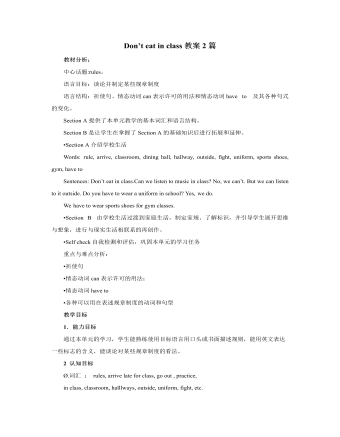
人教版新目标初中英语七年级下册Don’t eat in class教案2篇
Don’t fight. =You can’t fight. (板书,教读)教师把这些句子板书在黑板上,并请学生大声整齐地读祈使句和“can’t”句型,并让学生注意两种句型表达形式的不同和转换,“Don’t …=You can’t…”;并对学生说:These are our school rules. (板书,教读) You can’t break the school rules. Don’t break the school rules.(板书,教读)步骤3 :Practicea. T: Now, each of the students is breaking one of these rules.Please finish 1a.学生看图,完成1a的内容,检查答案并大声朗读校规。b. 听录音,完成1b,选出四位学生都违反了哪条校规;听之前,学生要读会英文名。c. 请两位学生朗读1c部分的句型;要求学生两人一组对话表演,SA扮演外校转来新生,SB告知本校校规。(学生可经过讨论,多说出他们想到的校规,不必只限于书上;教师应给予帮助)2) 第二课时(2a~4)步骤1 :warming up of revisionT: What are the rules at your school?学生使用“can”或祈使句表达各条校规;其中老师可引出“eat in the cafeteria outside”的表达。步骤2 :Practicea.T: Christina is an exchange student. She doesn’t know the rules. Let’s listen, what activities they’re talking about?学生听第一遍时,完成2a;第二遍时,完成2b;b. 请学生领读2c部分,看着2a完成的表格,理解2c活动的要求;分成小组针对2a进行问答;
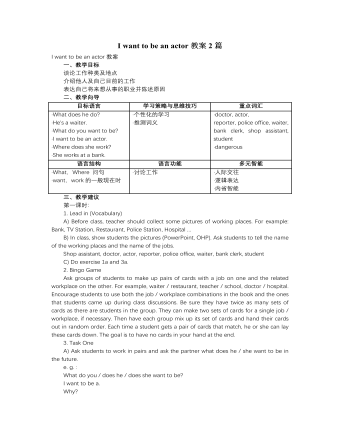
人教版新目标初中英语七年级下册I want to be an actor教案2篇
三、教学建议第一课时:1. Lead in (Vocabulary)A) Before class, teacher should collect some pictures of working places. For example: Bank, TV Station, Restaurant, Police Station, Hospital ...B) In class, show students the pictures (PowerPoint, OHP). Ask students to tell the name of the working places and the name of the jobs.Shop assistant, doctor, actor, reporter, police office, waiter, bank clerk, studentC) Do exercise 1a and 3a.2. Bingo GameAsk groups of students to make up pairs of cards with a job on one and the related workplace on the other. For example, waiter / restaurant, teacher / school, doctor / hospital. Encourage students to use both the job / workplace combinations in the book and the ones that students came up during class discussions. Be sure they have twice as many sets of cards as there are students in the group. They can make two sets of cards for a single job / workplace, if necessary. Then have each group mix up its set of cards and hand their cards out in random order. Each time a student gets a pair of cards that match, he or she can lay these cards down. The goal is to have no cards in your hand at the end.3. Task OneA) Ask students to work in pairs and ask the partner what does he / she want to be in the future.e. g. :What do you / does he / does she want to be?I want to be a.Why?Because it's (adj).B) Vocabulary: Section B, 1a4. Homework 1.2.
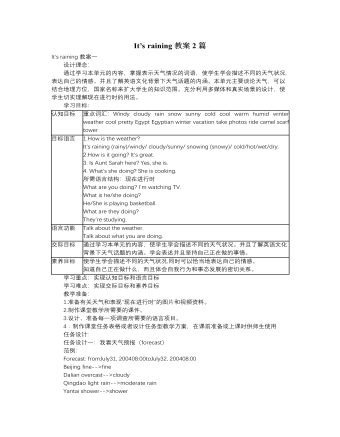
人教版新目标初中英语七年级下册It’s raining教案2篇
1 Each group choose one place to describe and what you are doing in it Choose one place, and describe what they are doing 2 Move around the room and give suggestions Talk about it and write it down 3 Ask one to show their works and act it Choose one of each group to make a report 4 Evaluate the best group and the best reporter Choose the best one Homework Ask your friends their ideal place and write about it教学反思:新课程标准中强调学生在课堂中的主体地位,在综合课中他们的主体地位就更加突出。在各个活动中给不同程度的学生不同层次的任务,让各层面的学生都有表现发挥的机会,从而产生对英语的兴趣。使用照片图片多媒体来辅助教学,效果更好。同时让了解其他国家风景,风俗的同学介绍ideal place,增加学生的背景知知识,实现跨学科交流的目的。教案点评:采用任务型教学模式,在各个活动中给不同程度的学生不同层次的任务,让各层面的学生都有表现发挥的机会,从而产生对英语的兴趣。使用照片图片多媒体来辅助教学,效果更好。让了解其他国家风景,风俗的同学介绍ideal place,增加学生的背景知识,实现跨学科交流的目的。
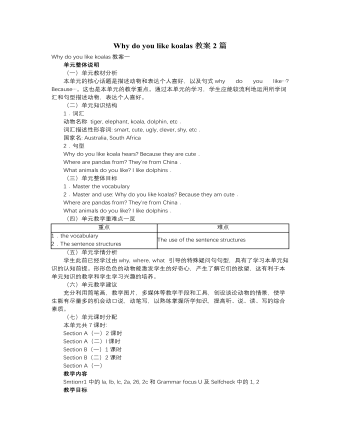
人教版新目标初中英语七年级下册Why do you like koalas教案2篇
单元整体说明(一)单元教材分析本单元的核心话题是描述动物和表达个人喜好,以及句式why do you like…? Because…。这也是本单元的教学重点。通过本单元的学习,学生应能较流利地运用所学词汇和句型描述动物,表达个人喜好。(二)单元知识结构1.词汇动物名称 tiger, elephant, koala, dolphin, etc.词汇描述性形容词: smart, cute, ugly, clever, shy, etc.国家名: Australia, South Africa2.句型Why do you like koala hears? Because they are cute.Where are pandas from? They're from China.What animals do you like? I like dolphins.(三)单元整体目标1.Master the vocabulary2.Master and use: Why do you like koalas? Because they am cute.Where are pandas from? They're from China.What animals do you like? I like dolphins.(四)单元教学重难点一览(五)单元学情分析学生此前已经学过由why, where, what 引导的特殊疑问句句型,具有了学习本单元知识的认知前提。形形色色的动物能激发学生的好奇心,产生了解它们的欲望,这有利于本单元知识的教学和学生学习兴趣的培养。
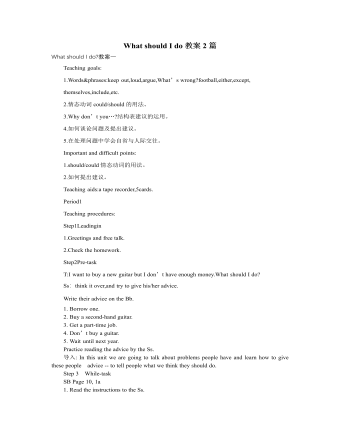
人教版新目标初中英语八年级下册What should I do教案2篇
说明:在帮Li Lei提建议的同时,教育学生如何学好英语。第三课时教学目标1. 语言目标:a) 词汇: Original, in style, haircut, the same as.b) 语言结构:My friend wears the same clothes and has the same haircut as I do.2. 能力目标:大多数学生能够谈论自己喜欢哪种服装,提高查找信息的能力。3. 情感目标:学会如何与朋友相处,要有自己对时尚的看法。教学重点掌握一些重要词汇。教学难点学会谈论问题,并能提出书面建议。◆教学突破首先针对Erin的问题,提出个人的建议,模仿2c部分的对话展开双人交际Pair-work;听老师诵读3a部分的信件,并找出LEFT OUT的问题所在;学生完成3b部分的内容,给Left Out提出书面的建议;学以口头形式提出自己目前存在的某个问题,讲给大家听,让同学们给自己提出一个建议,并作笔录;学生两、三个人分成一组,随意性地进行口语交际,谈论P14的第4部分的某个问题,相互交换意见。
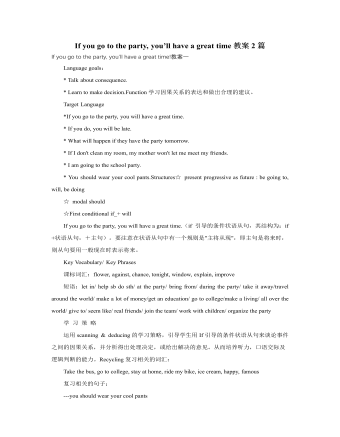
人教版新目标初中英语八年级下册If you go to the party, you’ll have a great time教案2篇
区分宾语从句、定于从句和状语从句宾语从句和状语从句,都叫做主从复合句。宾语从句主要是中考必考的,是初中阶段必掌握的从句,宾语从句主要是掌握三要素,所谓宾语从句,就是宾语在主从复合句当中充当宾语的一个句子,叫做宾语从句。主句的谓语动词是及物动词,后面如果是词或者是短语的话,是简单句,如果是句子的话,肯定是宾语从句。I know that he good at English.就是宾语从句,三要素,一要素是要注意连词,连词一共学了三类连词,一类连词是that口语当中可以省略,就像刚才说的那一句,I hear he is good at English.还有疑问代词、疑问副词,how where when,疑问代词、疑问副词。还有一类连词weather是否的意思,不是状语从句当中的如果,这一定要和如果区分开,这是是否。I don't know if he interested at English。宾语从句要注意if是连词。第二要素是语序,要用陈述举语序。比如说你家有几口人,我们都说How many people are there in you family?但是这是简单句,一旦说成宾语从句,你可以告诉我你家有几口人吗?Could you tell me how many people there are in you family ?

人教版新目标初中英语八年级下册It’s a nice day, isn’t it教案2篇
"Hello! Welcome to English class! Introduce yourself. Meet your new classmates." That's what the teacher says. What do you say? "Oh no!" It can be difficult talking to new people. But it can be fun, and you can make friends. How do you do it? Make small talk. Small talk is polite conversation. "Wang Nan is a great pingpang player, isn't she?" "I'd love to meet her, wouldn't you?" "It's been raining a lot, hasn't it?" Tag questions are a form of polite speech. To make small talk successfully, you should know how to make them. You should also know what topics to talk about. Try to learn this unit carefully. The next time you're in English class, you'll find out. Making small talk's easy, isn't it? (“你好!欢迎你!请做一下自我介绍。认识一下你的新同学。”通常在课上老师会这样说。你会说什么呢?“噢,不!”与陌生人谈话太困难了。但是这也很有意思,并且你还能交到朋友。你该怎么做呢?闲聊。闲聊指得是礼貌的对话。“王楠是一个很棒的乒乓球运动员,不是吗?”“我希望自己能认识她,你呢?“今年的雨水很多,不是吗?”反意疑问句是一种礼貌用语。为了使得谈话成功,你应该知道怎样去进行闲聊。你还应该知道与不同的人该谈论什么样的话题。认真的学习这个单元吧,下次在英语课上,你会发现与大家展开谈话是一件很容易的事情,不信我们来试试。)

人教版新目标初中英语八年级下册He said I was hard-working教案2篇
This activity introduces some new vocabulary and provide oral practice using the target language.Task 1 . Ask four students to stand in front of the class, and the teacher asks them the following questions as a reporter.1.What are you going to do when you grow up?2.What are you going to do next week?3.What are going to do after school?The students will give different answers, then ask a good student to report what they said.I am going to e a doctor.What did she say?----------She said she was going to be a doctor.I am going to have a party on Friday night.What did he say?-------He said he was going to have a party on Friday night.I am going to do my homework.What did she say ?------ She said she was going to do her homework.I am going home after school.What did she say?-----She said she was going home after school.Say In this unit we are going to learn to use words like to report what someone said.Task 2. Read the instructions. Then ask a student to read the four questions. And write the words on the Bb. Explain what soap opera is.Task 3. Ask the students to Look at the pictures, point out the TV screens in the picture. Ask one girl to read what Marcia said.What did Marcia say? She said She said she was having a surprise party for Lana on Friday night. Repeat the other pictures in the same way.Activity3. Listen and number the pictures in activity 1a.

人教版新目标初中英语七年级下册How was your weekend教案2篇
Teaching Goal:1. General aims:Talk about recent past events2. Particular aims:A. Language Focus.Talk about recent past events and think of the past events.B. Language goalsHow was….?It was …What did …do over the weekend?C. Language structures:(1). How was your weekend? I was great. Pay attention to no form.(2). What did you do over the weekend? I played soccer. We went to the beach.D. Useful words and phrases:Words: was, did, went, beach, over, project, test, wasn’t, false, number, geography, spend, week, most, mixture, their, had, little, cook, read, saw, change, everyone, sit, sat, no, anythingPhrases: did one’s homework, played soccer, cleaned my room, went to the beach, played tennis, went to the movies, on Saturday morning, over the weekend, cook … for, what about, do some reading, have a party, talk show, go shoppingE. Grammar language:Present simple past tenseRegular and irregular verbsF. Learning strategies:Tour and holidaysG. Interdiscipinary:H. Emotion and manner:Teaching time: 5 periodsTeaching procedures:Period One教学步骤、时间 教师活动 学生活动 媒体应用Step 1Free talk 3’ Ask some questions like:Who’s on duty today?What’s the weather like? Answer and talk about something.让同学们回答下列问题1. Do you like weekend? (Let some students answer)It takes them three minutes to talk about the question.2. Why do you like weekend? (let the students answer) Most of the students like the weekend此时教师用汉语问:“在周末期间问你干了什么?这句话用英语这么回答?Let the students guess.At last the teacher give them right answer3. What did you do over the weekend?(板书、学习)



